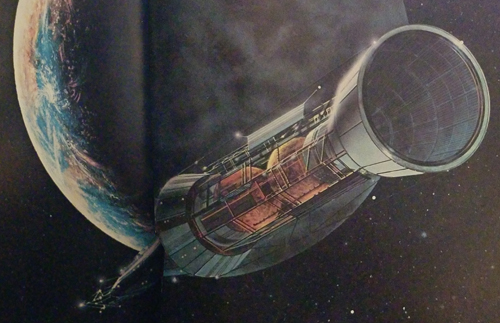Columbus class (FASA)
From Trekipedia
The Columbus class sublight explorer—an 8,600-ton craft powered by a high-acceleration, sub-light Bussard ramjet, and housing a crew of 40—entered service in 2040 as Earth's largest space-going vessels. The class boasted advanced fusion engines that could produce speeds of up to 0.75c and was the first Human spacecraft class to carry on-board shuttlecraft for extra-vehicular excursions, but new ships incorporating Zefram Cochrane's warp drive engines soon superseded the class for interstellar flight, and the last ship of the class was retired in 2075.[1]
Specifications
| Length | 120m |
| Diameter | 37.2m |
| Mass | 8.6 million kg |
| Engines | Geodyne Fusion Engine pack |
| Fuel | antimatter-spiked deuterium (50:1 deuterium to antimatter) |
| Complement | 40 Overall 4 Officers 36 Crew |
| Navigation | Elementary Interstellar Celestial Guidance |
| Communication | Laser/Particle Beam Subcarrier Radiotelemetry |
| Computer | Intermediate Independent Thought Memory Scan |
| Life Support | Gravity 0.4-0.75g Atmosphere 22% O2; 14% humidity |
| Sustenance Duration | 1-13 years at standard ship's complement |
| Weapons | 4 forward lasers 25 fusion torpedoes |
Performance
| Range | Standard 5.75 billion km (Earth-Pluto) Maximum 8.5 light years |
| Velocity | Cruising 0.75c Maximum 0.85c |
| Typical Voyage Duration | Earth-Pluto 10 hrs Earth-Alpha Centauri 11.5 years |
| Thrust | 1 billion kg |
Notes and References
- ↑ Goldstein, Stan et al (Authors). Spaceflight Chronology. Star Trek. Book. Wallaby Books. 1980.

